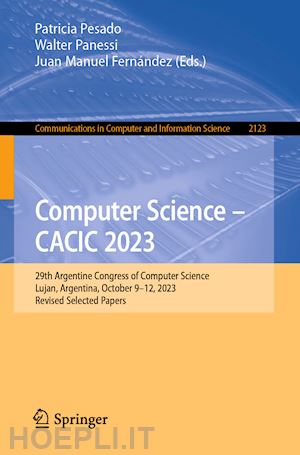

Questo prodotto usufruisce delle SPEDIZIONI GRATIS
selezionando l'opzione Corriere Veloce in fase di ordine.
Pagabile anche con Carta della cultura giovani e del merito, 18App Bonus Cultura e Carta del Docente
This book constitutes the refereed proceedings of the 29th Argentine Congress of Computer Science on Computer Science - CACIC 2023, held in Luján, Argentina, during October 9–12, 2023.
The 27 full papers included in this book were carefully reviewed and selected from 142 submissions. They were organized in topical sections as follows: agents and systems; distributed and parallel processing; technology applied to education; graphic computation, images and visualization; software engineering; databases and data mining; hardware architectures, networks, and operating systems; innovation in software systems; signal processing and real-time systems; innovation in computer science education; computer security; digital governance and smart cities.
.- Agents and Systems.
.- Nonlinear Models in Optimal Instrumentation. A Fast Technique for Precision Evaluation.
.- Determination of hyperparameters in the development of a frost predictive model with Data Science.
.- Distributed and Parallel Processing.
.- Evaluation of programming languages for memory usage, scalability, and cold start, on AWS Lambda Serverless platform as a case study.
.- Enhanced OpenMP Algorithm to Compute All-Pairs Shortest Path on x86 Architectures.
.- Technology Applied to Education.
.- Embedded Systems Programming through eUCCvm, an Integrated Educational Tool.
.- Assessing Participation and Academic Performance in Discussion Forums: A Systematic Review.
.- Basic electronics virtual laboratory for university students in an extended classroom.
.- Graphic Computation, Images and Visualization.
.- Improving Cryptocurrency Visual Analysis with Crypto Visualizer+.
.- Software Engineering.
.- Formally Verifying Data Science Systems with a Sound an Correct Formalism.
.- API Management and SQuaRE: a comprehensive overview from the practitioners’ standpoint.
.- Towards optimal non-functional requirements elicitation and documentation in agile software development: A case study.
.- Validation of metrics for the deployment of software systems: Case studies in SMEs in Argentina.
.- Quality 4.0 in Software Engineering: Incorporating Scaled Agile Insights to a Framework Proposal.
.- Databases and Data Mining.
.- Personality Traits Assessment: a Case of Study Using Text Mining Techniques.
.- Effects of Topological Factors and Class Imbalance on Node Classification through Graph Convolutional Neural Networks.
.- First Experiences with the Identification of People at Risk for Diabetes in Argentina using Machine Learning Techniques.
.- Hardware Architectures, Networks, and Operating Systems.
.- Case Study: Methodology for the Design and Development of Distributed Embedded Systems.
.- Innovation in Software Systems.
.- Integration of Brain-Computer Interfaces with Alternative Augmentative Communication Systems.
.- Accessible Software Desing: thinking outside the box.
.- Analyzing Induced Functional Dependencies from Spreadsheets in the GF Framework for
Ontology-Based Data Access.
.- Signal Processing and Real-Time Systems.
.- Data Acquisition System Using Low-Complexity Sensors for Ancient Tractors in the Río Negro and Neuquén Valley.
.- ADS-B Support to SSR.
.- Innovation in Computer Science Education.
.- Teaching Strategies for Programming in Massive University Settings.
.- Rubric-Driven Competency Development: A Case Study.
.- Computer Security.
.- Pseudorandom Binary Generator Based on Combining Nonlinear Feedback Shift Registers.
.- Exploration of Hybrid Neural Networks for Domain Name Generation.
.- Digital Governance and Smart Cities.
.- Contribution to SDGs 2030 through the CAP4CITY Project and a Master in Smart Cities Management and Technology.











Il sito utilizza cookie ed altri strumenti di tracciamento che raccolgono informazioni dal dispositivo dell’utente. Oltre ai cookie tecnici ed analitici aggregati, strettamente necessari per il funzionamento di questo sito web, previo consenso dell’utente possono essere installati cookie di profilazione e marketing e cookie dei social media. Cliccando su “Accetto tutti i cookie” saranno attivate tutte le categorie di cookie. Per accettare solo deterninate categorie di cookie, cliccare invece su “Impostazioni cookie”. Chiudendo il banner o continuando a navigare saranno installati solo cookie tecnici. Per maggiori dettagli, consultare la Cookie Policy.